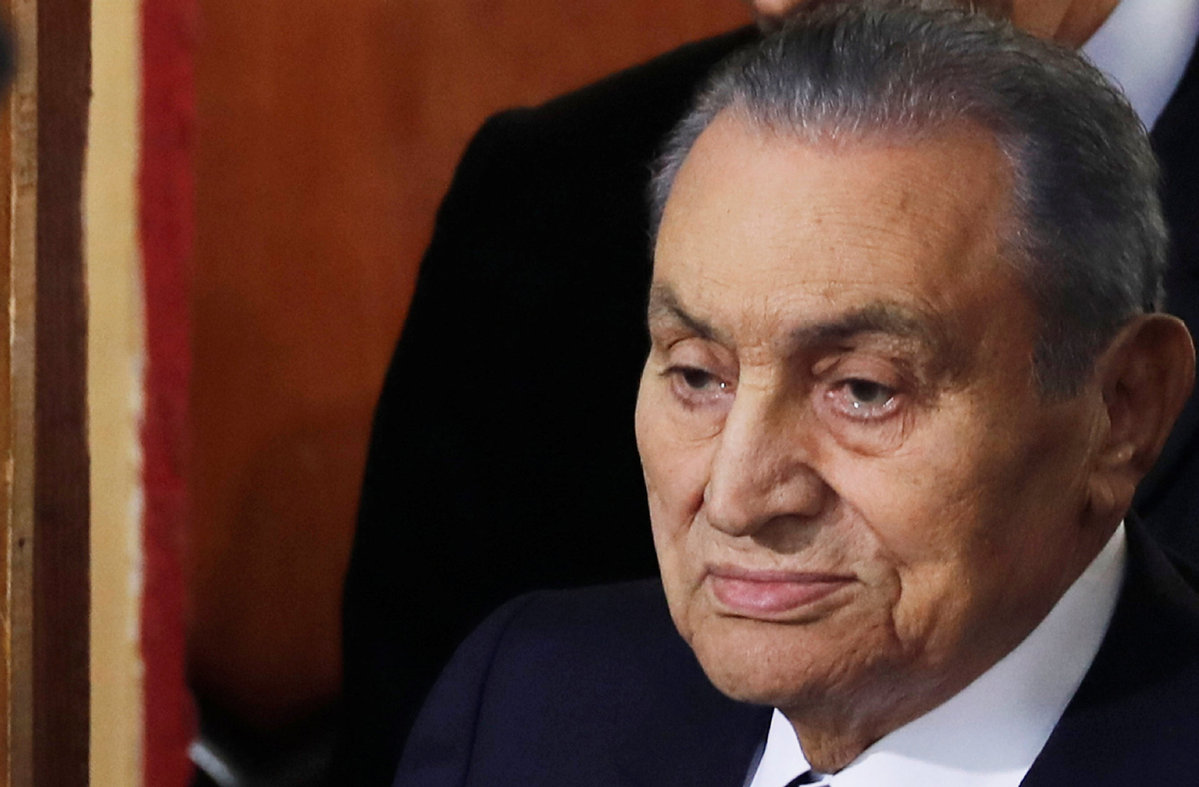Former Egyptian president Mubarak testifies in ousted President Morsi's retrial in 'jailbreak case'


CAIRO - Former Egyptian President Hosni Mubarak testified on Wednesday in the retrial of ousted Islamist President Mohamed Morsi and others in the case known in the media as the "jailbreak trial," official Ahram Online website reported.
The case dates back to violent incidents surrounding a jail breakout after Jan. 28, 2011.
In June 2015, a Cairo criminal court sentenced Morsi and five other top Brotherhood figures to death over charges of damaging and setting fire to prison buildings, murder, attempted murder, looting prison weapons depots and releasing prisoners while escaping from the Wadi El-Natroun prison, north of the capital Cairo.
In November 2016, the Court of Cassation revoked death sentences and ordered retrials for Morsi and other defendants.
Morsi was deposed by the army in early July 2013, in response to mass protests against his one-year rule and his Muslim Brotherhood.
Mubarak, who was ousted during the January 2011 uprising, arrived to the court accompanied by his sons Gamal and Alaa.
After swearing the oath, Mubarak asked to be granted permission from the Egyptian president and the commandership of the Egyptian Armed Forces before revealing to the court information related to the tunnels between Gaza and Egypt, so as not to be violating the law, according to Ahram.
The prosecution has charged that supporters of the now-banned Muslim Brotherhood and the Palestinian Hamas movement infiltrated the Egypt-Gaza border through tunnels after the outbreak of the January revolution to storm jails and free imprisoned Brotherhood members.
However, the head judge told Mubarak that the court is seeking information not related to national security issues, and instructed Mubarak to answer questions.
Mubarak, who rarely makes media or public statements since his ouster, told the court that the tunnels between Gaza and Egypt had existed long before the Jan 25 revolution and that they were mostly used to transfer food commodities and other goods.
When asked by the judge whether the tunnels were used during the early days of the revolution, Mubarak declined to answer without permission from the president and the commandership of the armed forces to speak on the matter.
Nevertheless, he stated that former head of the general intelligence service Omar Suleiman informed him on Jan 29 2011 that about 800 militants had infiltrated the eastern border through the tunnels.
The 90-year-old former president added that "militants killed policemen and protesters in Tahrir Square, the birthplace of the 2011 anti-Mubarak uprising, creating chaos in the country," and that they broke out Muslim Brotherhood members from jails.
He said that he believes there are "lots of plots" but could not address them without a permission from the presidency.
Mubarak, who has been receiving treatment in a military hospital in Cairo, told the court that he "handed over the country" to the Egyptian armed forces so "Egypt won't fall."
The court adjourned the case to Jan 24, 2019.
In March 2017, Mubarak was acquitted of the charges of killing protesters during the 2011 uprising that led to his ouster.
In September, an Egyptian court declined an appeal for reconciliation in a corruption case submitted by Mubarak and his two sons.
Mubarak and his two sons were sentenced in May 2015 to three years in prison for embezzling funds meant for maintaining presidential palaces.
They were also sentenced to collectively pay a fine of about 126 million Egyptian pounds (7 million US dollars) and return about 21.2 million pounds.
Gamal and Alaa were released in October 2015 since their jail term was covered by the years they had already served in provisional detention.
Mubarak's two sons, along with other defendants, are also accused of making illegal financial gains of over 493 million pounds by allowing a Cyprus company to acquire a national bank's shares through hidden deals.
Cairo Criminal Court decided in September to release Gamal and Alaa on bail of 100,000 pounds.
































